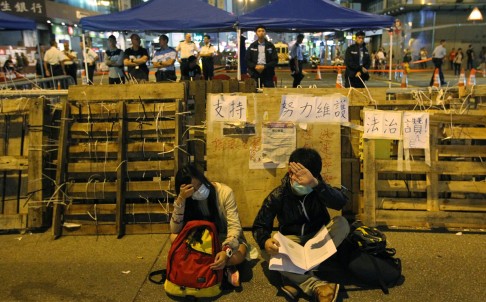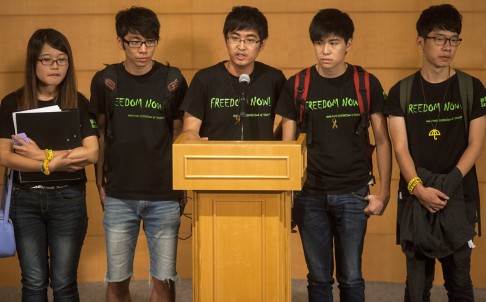Occupy Central
Occupy Central is a civil disobedience movement which began in Hong Kong on September 28, 2014. It calls on thousands of protesters to block roads and paralyse Hong Kong's financial district if the Beijing and Hong Kong governments do not agree to implement universal suffrage for the chief executive election in 2017 and the Legislative Council elections in 2020 according to "international standards." The movement was initiated by Benny Tai Yiu-ting, an associate professor of law at the University of Hong Kong, in January 2013.
OCCUPY CENTRAL - DAY 42: Full coverage of the day’s events
Police will back bailiffs to enforce injunctions to end Occupy sit-ins
Decision Monday on injunctions that call for Mong Kok and Admiralty sites to be cleared
PUBLISHED : Saturday, 08 November, 2014, 4:04am
A High Court judge will rule on Monday on applications for injunctions to clear barricades at Occupy protest sites in Mong Kok and Admiralty. Photo: Edward Wong
A High Court judge will rule on Monday on applications for injunctions to clear barricades at Occupy protest sites in Mong Kok and Admiralty.
 If the Court of First Instance rules in favour of the applicants, bailiffs will be sent to carry out the court orders.
If the Court of First Instance rules in favour of the applicants, bailiffs will be sent to carry out the court orders.
Legal experts suggest that police could step in if public peace was broken or disturbed, while a police source confirmed that officers would help bailiffs execute the orders if the court gives such a direction.
Chiu Luen Public Light Bus Company, the Taxi Association and the Taxi Drivers and Operators Association are asking for parts of Nathan Road, Mong Kok, to be cleared, while Goldon Investment, owner of Citic Tower in Admiralty, is seeking the removal of barricades blocking the building's entrances and exits.
Dennis Kwok, a barrister and the legal sector lawmaker, said: "Bailiffs could report to the judge if they have difficulties in executing the orders and seek court directions."
He said police could make arrests if there was a breach of the peace when bailiffs carried out their duties.
Eric Cheung Tat-ming, principal law lecturer at the University of Hong Kong, said it was an offence for anyone to obstruct police officers in the execution of their duty.
The police source said: "We will discuss with bailiffs and issue enough warnings to illegal occupiers before going together with bailiffs to execute the orders and tear down barricades."
He stressed that those who refused to leave or obstructed officers in the execution of their duty would face arrest.
The barricades in Mong Kok were likely to be the first to be removed, the source said, and at least 1,000 officers would be deployed there for the purpose.
In Admiralty, 22-year-old protester Sing Yu, who has been camping outside Citic Tower for two weeks, said: "If the injunction requires us to remove our barricades on Lung Wui Road and the tents outside the building, personally, I would accept the decision."
In Mong Kok, Enzo Tang said he would not obstructing "real bailiffs" from carrying out their duties.
Another protester said whether he would resist bailiffs or police would depend on the response of fellow protesters.
Separately, the court will hear injunction applications filed by Kwoon Chung Bus and its subsidiaries on Tuesday.
According to court documents, about one-fifth of the roads occupied by pro-democracy protesters in Admiralty would be reopened if the injunctions sought by bus operators are granted.
This article appeared in the South China Morning Post print edition as Police will back bailiffs to carry out court ruling
Desperately seeking new ideas to break Occupy impasse
PUBLISHED : Saturday, 08 November, 2014, 5:27am
Student leaders speak at a press briefing after a meeting with government officials to attempt to resolve the pro-democracy road occupations and resulting political crisis. Photo: EPA
After six weeks on the streets and one round of unproductive talks, all we have is an impasse between the Occupy movement and the government.
There are not even proposals for a second round of talks. Both sides seem to be completely bereft of new ideas to resolve the situation.
What is the point in the Occupy movement's plan of going to Beijing or asking for talks with Li Keqiang if the protesters have nothing to say except to ask for withdrawal of the August 31 decision?
Does the government want the occupiers to just roll up their tents and go home with no clarity on their main demands? The administration has to understand that governing goes beyond sending in the police and includes convincing the citizens.
Rather than ask for a withdrawal of the August 31 decision, both sides (and the central government) should be exploring points where mutually acceptable changes can be made to the decision.
For example:
1. What can be done to change the 1,200-person committee to make it more acceptable? Can it be expanded to, say, 2,000 with a greater share of directly elected representatives? Can its composition be changed?
2. Can the minimum requirement of 50 per cent of 1,200 votes be lowered, say to 12.5 per cent or even 25 per cent? That would let people with different viewpoints enter the election, particularly if the ceiling of three candidates is waived.
3. Can the field of three candidates be expanded to, say, 10? This change is not so meaningful if each candidate has to get 50 per cent of 1,200 votes, but it would at least generate more competition of ideas.
4. Can there be a time-bound road map to real free elections in 2022, combined with one of the above alternatives for 2017? That may make the 2017 compromises more acceptable to both sides.
5. The government has proposed a multiparty consultation system. Can that system be adopted?
Some of these solutions can be discussed within the framework of the August 31 decision, and that may be the winning card in this situation.
If there are indeed some backdoor negotiations going on in search of solutions, it is good to say so.
The image in the minds of the Hong Kong people and international watchers is that there is a standstill with no ideas from either side.
Dilip Parameswaran, Pok Fu Lam
This article appeared in the South China Morning Post print edition as Desperately seeking new ideas to break Occupy impasse
http://www.scmp.com/topics/occupy-centra
l


沒有留言:
張貼留言